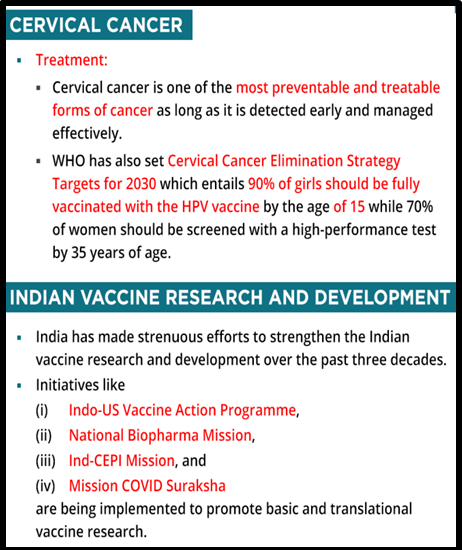ICMR WARNS OF CERVICAL CANCER CRISIS
Why in the news?
- The Indian Council of Medical Research (ICMR) highlights an urgent need for increased cervical cancer screening and vaccination.
- Projected impact: By 2025, cervical cancer will result in a loss of 1.5 million years of life in India, due to early deaths or disabilities.
Current Statistics:
- In 2016, the burden was 223.8 Disability Adjusted Life Years (DALYs) per 100,000 women.
- The ICMR’s projection is based on this data, forecasting significant health impacts if no action is taken.
Recommendations and Future Outlook:
- ICMR calls for expanding screening coverage from 2% to 70% of women.
- The plan includes scaling up HPV vaccination to 90% coverage and conducting two lifetime screenings, aiming for cervical cancer elimination by 2070.
- States like Mizoram, Arunachal Pradesh, Karnataka, and Nagaland show a higher burden, with DALYs exceeding 300 per 100,000 women.
 source:slideshare
source:slideshare
About Indian Council of Medical Research (ICMR):
- Established: Originally IRFA in 1911, redesignated ICMR in 1949.
Mandate:
- Apex body for biomedical research in India.
- Conducts and coordinates research for societal benefit.
- Translates innovations into public health solutions.
- Vision: Improving population health through research.
Structure:
- Governed by the Union Health Minister.
- Scientific Advisory Board of experts.
- Research through 32 national institutes across India.
About Cervical Cancer:
- Development: Occurs in the cervix; 4th most common cancer among women globally.
- Cause: 99% linked to high-risk HPV, spread through sexual contact.
- Strains: HPV types 16 and 18 cause ~70% of cases; 14 oncogenic types identified.
- Challenges: Lack of awareness, late detection, and limited healthcare access.
- India: 2nd most common cancer; 2022 saw 1,23,907 new cases and 77,348 deaths.
CERVAVAC :
Description:
- India’s first indigenously developed quadrivalent HPV vaccine.
- Targets four virus strains: Type 6, 11, 16, and 18.
- Based on Virus-Like Particles (VLP), similar to Hepatitis B vaccine.
Significance:
- Approved by DGCI; enables bulk procurement.
- Effective before first sexual intercourse.
- Potential to eliminate cervical cancer; lower cost could support inclusion in Universal Immunisation Programme (UIP).
Global Context:
- Existing vaccines in India: Quadrivalent (Gardasil) and bivalent (Cervarix) are costly and not included in national immunisation programs.
|
source:slideshare




